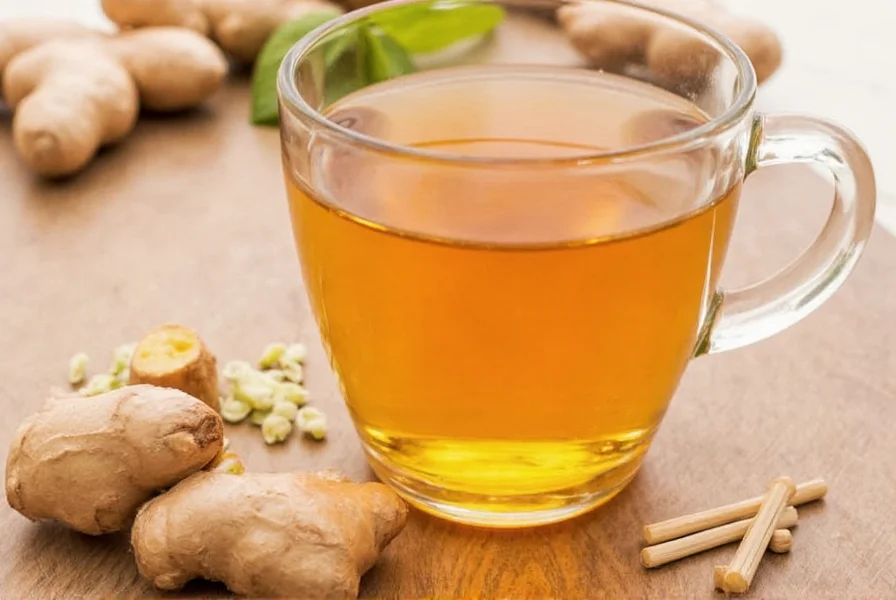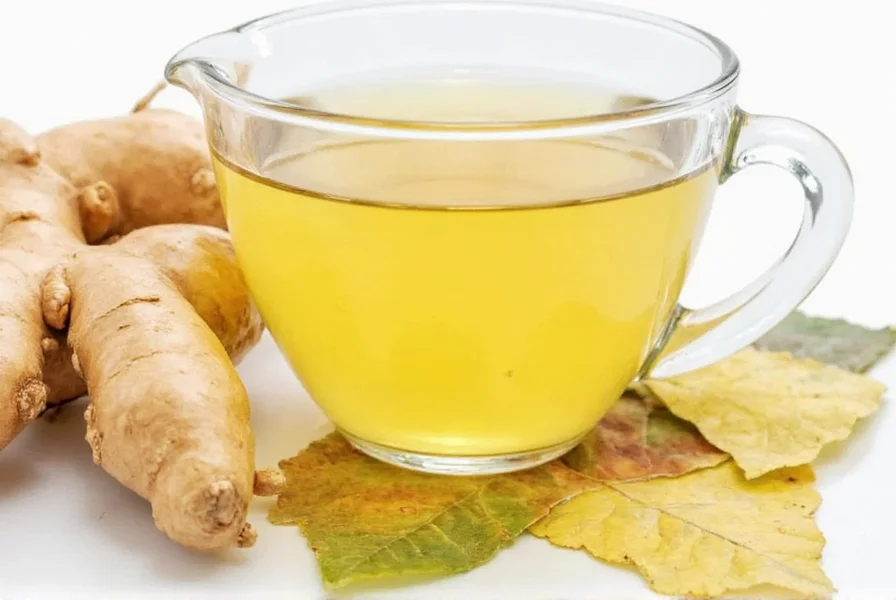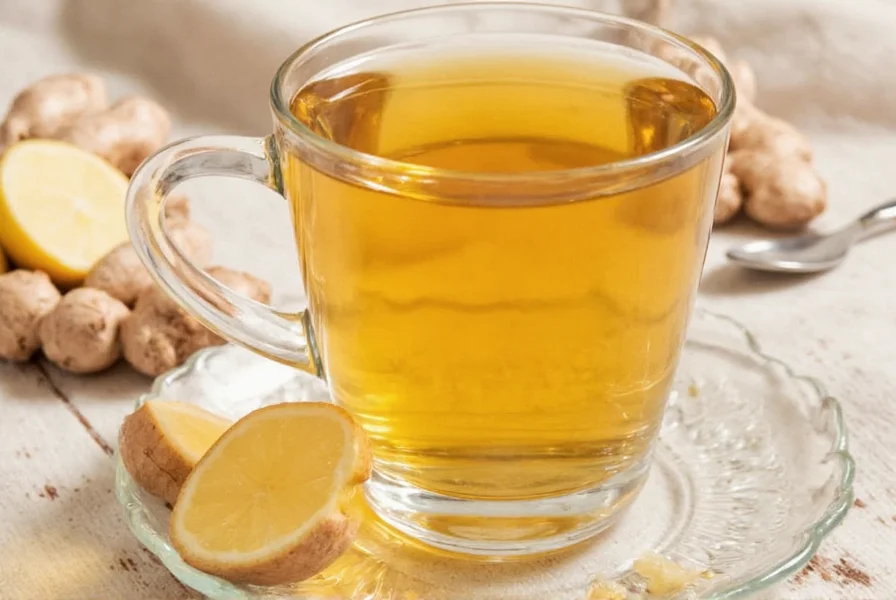The simplest way to make ginger tea is to slice 1-2 inches of fresh ginger root, boil it in 2 cups of water for 10-15 minutes, then strain and add lemon or honey to taste. This basic preparation delivers ginger's natural health benefits while creating a warming, aromatic beverage ready in under 20 minutes.
Creating the perfect cup of ginger tea combines simplicity with science. This ancient remedy has been used for centuries across Asian and Middle Eastern cultures for its digestive benefits and immune-boosting properties. Whether you're seeking relief from nausea, looking to improve circulation, or simply want a caffeine-free alternative to traditional teas, understanding the proper technique makes all the difference.
Essential Ingredients for Authentic Ginger Tea
While the core ingredient is straightforward, selecting quality components elevates your ginger tea from ordinary to exceptional. The best ginger tea starts with:
- Fresh ginger root - Look for firm, smooth-skinned rhizomes with no soft spots
- Purified water - Avoid tap water with strong chlorine taste
- Natural sweeteners - Raw honey or maple syrup (added after brewing)
- Complementary flavors - Lemon slices, mint leaves, or a cinnamon stick
Many people wonder whether to use peeled or unpeeled ginger. The skin contains valuable nutrients, so thorough washing is preferable to peeling unless the ginger appears dirty or waxed. Organic ginger requires only a good scrub before use.

Step-by-Step Brewing Process
Follow these precise steps for optimal flavor extraction and maximum health benefits:
- Wash 1-2 inches of fresh ginger root under cool running water
- Slice thinly (¼ inch) or grate for stronger flavor intensity
- Add ginger to 2 cups of cold water in a saucepan
- Bring to a rolling boil, then reduce heat to medium-low
- Simmer uncovered for 10-15 minutes (longer for stronger tea)
- Remove from heat and let steep an additional 5 minutes
- Strain into your favorite mug using a fine mesh strainer
- Add lemon juice or honey to taste after cooling slightly
Timing matters significantly when learning how to make fresh ginger tea. Boiling too briefly yields weak flavor, while over-boiling creates bitterness. The 10-15 minute simmer represents the sweet spot for balanced flavor and maximum curcumin extraction.
Popular Ginger Tea Variations
Customize your ginger tea experience with these evidence-based variations that address specific health needs:
| Variation | Ingredients | Best For |
|---|---|---|
| Immunity Boost | Ginger + turmeric + black pepper | Cold and flu season |
| Digestive Aid | Ginger + fennel seeds + mint | After heavy meals |
| Calm & Relax | Ginger + chamomile + lemon balm | Evening relaxation |
| Metabolism Kickstart | Ginger + green tea + cayenne | Morning energy boost |
Scientifically-Supported Health Benefits
Understanding how to prepare ginger tea properly maximizes its therapeutic potential. Research published in the Journal of Medicinal Food confirms that properly brewed ginger tea delivers:
- Nausea relief - Particularly effective for morning sickness and motion sickness
- Anti-inflammatory effects - Gingerols reduce inflammation markers in the body
- Digestive support - Stimulates saliva, bile, and gastric enzymes
- Antioxidant properties - Contains 16 unique antioxidants per scientific analysis
The bioavailability of ginger's active compounds increases when combined with healthy fats or black pepper. For maximum benefit when making ginger tea for digestion, add a pinch of black pepper to enhance absorption of gingerols.
Storage and Serving Recommendations
Proper storage maintains ginger tea's potency between brewing sessions:
- Cool completely before transferring to glass containers
- Refrigerate for up to 5 days in airtight containers
- Freeze in ice cube trays for longer storage (up to 3 months)
- Reheat gently without boiling to preserve active compounds
Serve ginger tea at 160-180°F (71-82°C) for optimal flavor release without scalding sensitive compounds. Adding honey after cooling slightly preserves its enzymatic benefits, which degrade above 140°F (60°C).

Troubleshooting Common Ginger Tea Issues
Even experienced tea makers encounter these common problems:
- Too bitter - Reduce simmer time or use less ginger; bitterness comes from over-extraction
- Weak flavor - Grate instead of slice, or increase ginger-to-water ratio
- Muddy appearance - Strain through cheesecloth for crystal-clear tea
- Spicy burn - Add honey or milk to moderate the heat sensation
For those wondering how to make ginger tea without fresh root, dried ginger powder works in a pinch (¼ teaspoon per cup), though fresh delivers superior flavor and higher concentrations of active compounds.
Frequently Asked Questions
How much ginger should I use per cup of tea?
Use ½ inch of fresh ginger per 8 ounces of water for mild tea, or 1 inch for stronger flavor. Grated ginger requires less quantity than sliced due to increased surface area. Adjust to your taste preference and tolerance for spiciness.
Can I make ginger tea with ground ginger instead of fresh?
Yes, you can substitute ¼ teaspoon of ground ginger per cup of water when fresh isn't available. However, fresh ginger contains higher concentrations of gingerols and provides superior flavor complexity. Ground ginger works best when combined with other spices like cinnamon or cardamom.
When is the best time to drink ginger tea?
Morning consumption supports digestion throughout the day, while drinking before meals can reduce nausea. Avoid late evening consumption as ginger's stimulating properties may interfere with sleep for some people. Those using ginger tea for menstrual cramps often find relief with regular consumption throughout their cycle.
How long does homemade ginger tea stay fresh?
Properly stored in a glass container, ginger tea remains fresh for 3-5 days in the refrigerator. For longer storage, freeze in ice cube trays then transfer to freezer bags. Thaw cubes as needed and reheat gently without boiling to preserve active compounds. Discard if cloudiness or sour smell develops.
Is it safe to drink ginger tea every day?
Most adults can safely consume 3-4 cups of ginger tea daily. Those with gallstone issues should consult a physician first. Pregnant women should limit to 1 gram of ginger daily (about 2 cups of strong tea). People taking blood thinners should discuss ginger consumption with their healthcare provider due to potential interactions.











 浙公网安备
33010002000092号
浙公网安备
33010002000092号 浙B2-20120091-4
浙B2-20120091-4